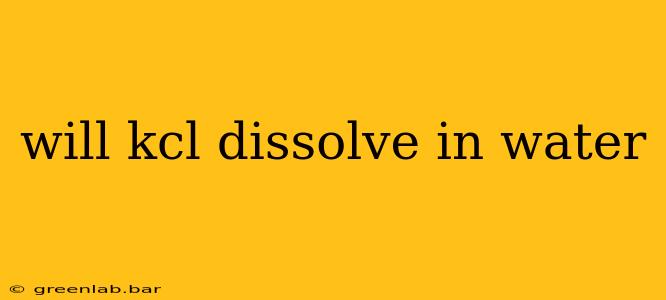Potassium chloride (KCl), a common salt, is frequently encountered in various applications, from fertilizers to intravenous fluids. A key characteristic determining its usefulness is its solubility in water. So, the simple answer is yes, KCl dissolves in water. But understanding why and the nuances of its solubility is crucial for numerous scientific and practical applications.
Understanding Solubility: Polarity and Ion-Dipole Interactions
The solubility of KCl in water stems from the fundamental properties of both substances. Water (H₂O) is a polar molecule, meaning it possesses a slightly positive end (hydrogen atoms) and a slightly negative end (oxygen atom). KCl, on the other hand, is an ionic compound, existing as a crystal lattice of positively charged potassium ions (K⁺) and negatively charged chloride ions (Cl⁻).
When KCl is added to water, the polar water molecules interact with these ions through ion-dipole interactions. The slightly negative oxygen atoms of water molecules are attracted to the positive potassium ions, while the slightly positive hydrogen atoms are attracted to the negative chloride ions. These attractive forces overcome the electrostatic forces holding the KCl lattice together, causing the ions to dissociate and become surrounded by water molecules – a process called hydration. This hydration shell effectively stabilizes the ions in solution, allowing KCl to dissolve.
Factors Affecting KCl Solubility
While KCl is readily soluble in water, several factors can influence the extent of its solubility:
1. Temperature:
The solubility of KCl in water increases with temperature. Higher temperatures provide water molecules with more kinetic energy, enhancing their ability to break apart the KCl lattice and solvate the ions.
2. Pressure:
Pressure has a relatively minor effect on the solubility of KCl in water, especially at normal pressures. The impact becomes more significant at extremely high pressures.
3. Impurities:
The presence of other dissolved substances in the water can influence KCl solubility. These impurities can compete with KCl ions for water molecules or form complex ions, potentially altering the overall solubility.
Applications Leveraging KCl's Solubility
The high solubility of KCl in water makes it suitable for numerous applications:
-
Agriculture: KCl is a vital source of potassium, a crucial macronutrient for plant growth. Its solubility ensures easy uptake by plants from soil solutions.
-
Medicine: KCl solutions are used intravenously to treat potassium deficiencies, highlighting the importance of its rapid and complete dissolution in bodily fluids.
-
Food Industry: KCl serves as a salt substitute in certain food products, capitalizing on its salty taste without the high sodium content of NaCl.
-
Industrial Processes: KCl's solubility is exploited in various industrial applications, including the production of fertilizers, chemicals, and other potassium-containing products.
Conclusion: Beyond a Simple "Yes"
While the initial answer to "Will KCl dissolve in water?" is a straightforward "yes," a deeper understanding reveals a fascinating interplay of chemical forces and factors affecting this seemingly simple process. The solubility of KCl is not merely a binary phenomenon; it's a dynamic equilibrium influenced by temperature, pressure, and the presence of other substances. This knowledge is essential for anyone working with KCl in various scientific, industrial, or agricultural settings.

